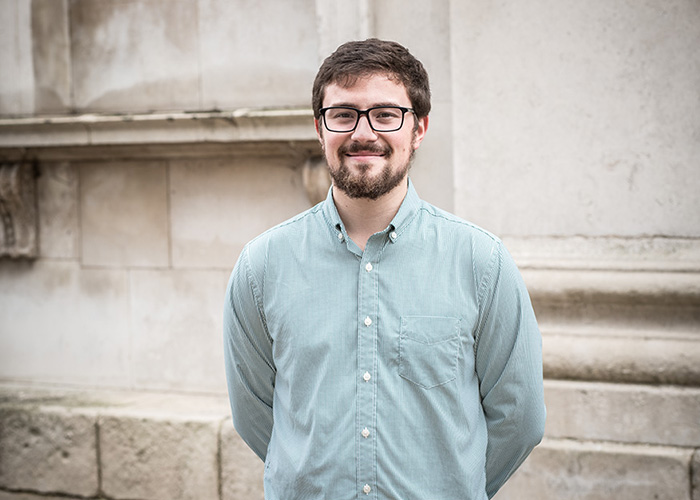Follow My Lead: Nicholas Barber
 Photo by Nick Saffell
Photo by Nick Saffell
January 24, 2019
BS Geoscience ’18
PhD Student, The University of Cambridge
For recent alumnus Nicholas Barber, science doesn’t end with discovery. A good scientist, he believes, uses research to inform policy, improve communities and mitigate harm to our planet. After five years at Drexel University — a journey brimming with awards, mentorship experiences and research — Barber is now studying earth science on a full scholarship at the University of Cambridge as the second Gates Cambridge scholar in Drexel history.
What motivated you to pursue a career in science?
The world is in a difficult position, owing to issues in politics, climate and resources. For me, the biggest motivator to pursue leadership in my field is the potential harm natural disasters can inflict on society. As Kendra Pierre-Louis noted in Popular Science, natural disasters are not natural — they are products of the decisions humans do or do not make in the event of a natural hazard. In the end, the scale of a disaster depends on whether scientists have accurately monitored and studied the hazard, whether engineers can plan and implement controls to mitigate the event, and whether policymakers implement the right protocols to ensure public safety. When any link in this chain breaks, the results can be catastrophic. Good science can inform good policy and can make a seemingly “natural” disaster preventable. I want to be part of a generation of scientists working to better understand volcanic behavior and improve our methods of predicting eruptions.
Number of Vacation Days I Took Last Year:
3 to 4 weeks, including university breaks
Fave Websites for Staying on Top of Job Trends:
Feedly, Twitter, Stack Exchange and Stack Overflow
Awards I’ve Received:
Goldwater Scholarship, NOAA Hollings Undergraduate Scholarship, Gates Cambridge Scholarship, Fulbright Study/Research Grant (declined to attend Cambridge)
You have an impressive resume of co-ops, leadership positions and awards. How did your time at Drexel shape you as a leader?
I had a unique opportunity at Drexel to experience leadership in research settings. My research adviser, Dr. Loÿc Vanderkluysen, allowed me to take on a leadership role in our lab for the past three years. I have mentored high-school-aged research students volunteering in our lab, as well as younger undergraduate researchers as part of an international project. I think this is an opportunity many undergraduates don’t get at other universities, and it makes my time at Drexel a standout experience as I begin my PhD.
Which of your accomplishments are you most proud of?
I would be lying if I didn’t say it was receiving the Gates Cambridge Scholarship to study earth science at the University of Cambridge. The application process was one of the toughest tasks I’ve taken on in my academic life. After I received the award, I met with several passionate Drexel undergraduates to talk about opportunities in research, and how a process like Gates works. Not only receiving the award, but also being able to use it as a mentoring tool, has made it one of the highlights of my young life.
How do you define success?
Successful people are those who recognize that their personal successes mean little if they don’t bring others along, or don’t try to translate their success into societal progress. These efforts can be small, but I believe personal achievements carry with them a duty to improve the world, using all the resources at your disposal.
What is one issue you are truly passionate about outside of your work?
I am incredibly passionate about historical and political literacy. In my free time, I read widely on world history and politics. I consume this information through books and, to a lesser extent, through social media. I want to make sure I can put global events related to my research in the proper context. If we hope to better understand how the world got to the state it’s in, all people need to have a baseline understanding of civics and global history. For me, this is an effort allowed by my great fortune to have free time, but for the millions of people without such luxury, our public schools and universities should mandate a more nuanced and stringent historical education.
In your opinion, what are the top three traits of a good leader?
First, the ability to listen and understand employees and collaborators. Second, a willingness to teach-by-doing and delegate. And third, a careful balance between being a friend and cheerleader, while still maintaining professionalism and authority.
For me, the combination of these traits allows a leader to be productive while collaborating effectively with members of their team. Giving your team permission to fail, and then constructively discussing what went wrong, allows individuals to grow at their own pace and internalize lessons far better than lecturing.
A full ride to Cambridge is no small feat! What’s next? What do you hope to accomplish in your career?
I want to spend my life studying volcanic systems, researching new methods and techniques to improve our ability to predict when and how eruptions might occur. I want to focus my efforts on volcanoes in Southeast Asia, Africa and South America, where the impact of volcanoes on large population centers is so acute.
At the same time, I want to bring up a new generation of volcanologists who seek the same career goal, with the added motivation of rooting our field work in the communities in which we work. It does the world no good to make a prediction about when a given eruption will occur without working to share and disseminate such information with the communities and governments that may be affected.
* This article originally appeared in the College of Arts and Sciences' Ask magazine feature story, “Follow my Lead.” For more Ask stories, visit askmagazine.org.
For more information on fellowship opportunities like the Gates Cambridge, Goldwater and NOAA Hollings Scholarships, visit the Drexel Fellowships Office.